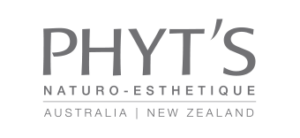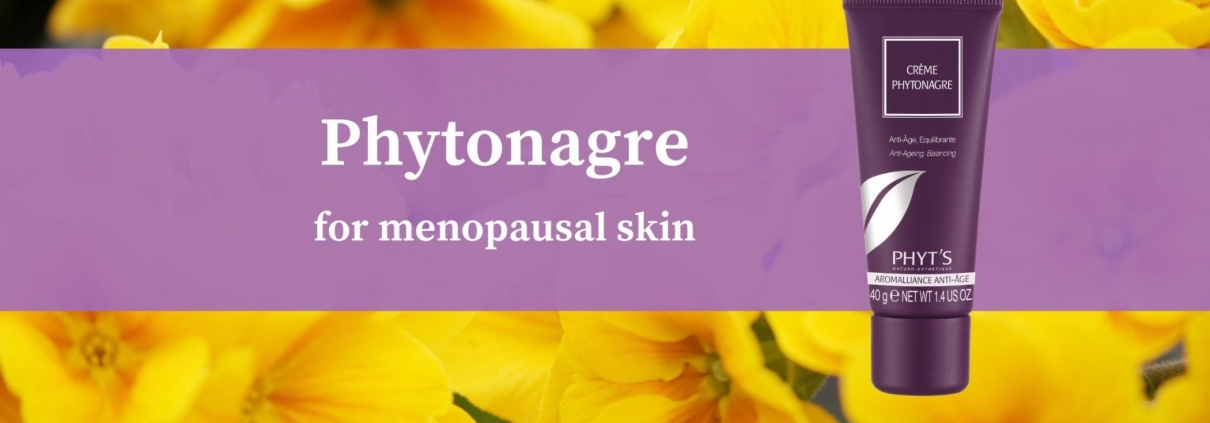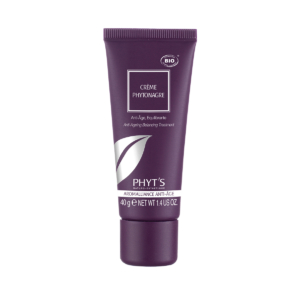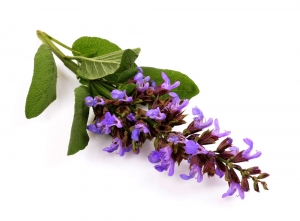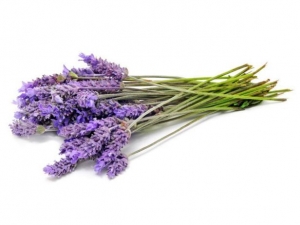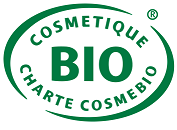Phytonagre for menopausal skin
Skin is the largest organ of our body. It acts as a physical barrier between us and the environment, protecting internal organs, and regulating metabolic activity such as temperature and water balance. It is subject to ageing, just like every other organ system of the body. Skin ageing includes the loss of elasticity, a reduction in epidermal thickness and collagen content, elastic fibre degeneration, increased wrinkling, and dryness. This is particularly obvious at the time of the fast hormonal changes in women: menopause.
Can skincare really help?
We know how estrogen affects the skin structure and how low levels of this hormone are connected to skin ageing. Estrogen receptors have been detected in the skin, so it seems logical to think that the application of a product containing compounds that mimic estrogen would be effective in treating ageing skin. Phytoestrogens are such ingredients. They are mainly derived from natural plants and foods. They are tiny structures, easily absorbed with a delivery system already built into receptor sites in the dermis and epidermis of the skin. In recent years, phytoestrogens have become a research hotspot in the fight against skin ageing. Phytoestrogens are found in the reproductive parts of plants such as yucca root, soybean, clary sage, flaxseed, red clover, and grape extracts.
Hydration is another factor that needs to be increased for skin firmness and elasticity. A hydrating agent such as hyaluronic acid can help increase hydration level. It’s a water-binding agent meant to capture and retain moisture levels in the skin. Adding in this key element is a great way to get instant plumping effects.
Phyt’s Phytonagre: a time-tested, 100% natural and certified organic skincare support for pre and post-menopausal skin.
A treatment cream formulated for menopausal skin lacking in vital elements. Phytonagre is rich in Evening Primrose Oil, Borage, Soybean bean extracts, Clary Sage and a synergy of other phytoestrogen-rich active ingredients. These helpful compounds help minimise the appearance of pores, boost the skin’s repair function, and increase the production of hyaluronic acid. Phytoestrogens also suppress sebum production to decrease breakout activity and offer an overall calming effect on the skin.
This anti-ageing balancing, rich and firming moisturiser helps to calm hormonal imbalances such as sensitivity, especially showing across cheeks and nose. This is achieved through the expertly formulated combination of powerful actives indispensable for hormonal balance and the fight against the effects of inflammation.
Evening Primrose
The main chemical constituents of Evening Primrose Oil are Linoleic Acids (Omega-6), γ-Linolenic Acid (Omega-6), Oleic Acid (Omega-9), Palmitic Acid, and Stearic Acid – each one of these acids being proven to help slow the look of ageing by sustaining skin elasticity and softness. Evening Primrose oil is an ideal ingredient in formulations for mature skin. With astringent and softening properties, it promotes the look of a healthy, clear, rejuvenated complexion with enhanced radiance, while reducing premature wrinkles and fine lines.
Borage oil
Borage oil is an extract made from the seeds of the Borago officinalis plant. The oil is prized for its high gamma linoleic acid (GLA) content. This substance acts like a hormone in the body, helping reduce inflammation tied to skin diseases and cardiovascular issues. Borage oil is said to have the highest GLA content compared with other essential oils. Effective on skin elasticity, it combats dryness and reinforces the barrier function thus preventing dehydration. It is also rich in essential fatty acids.
Soybean Extract
A natural potent antioxidant, restoring, and soothing agent for the skin, derived from soybeans. What makes this extract a powerful ally with pre and post-menopausal skin is genistein, which is an isoflavone found in low concentrations in soybeans. Genistein has been recently considered an ideal natural selective estrogen receptor modulator (SERM). Researchers have explored the mechanism by which genistein delays skin ageing, and it was found that it significantly increases skin thickness.
Clary Sage
For centuries, Clary Sage essential oil has been revered for its benefits to women’s health. Clary Sage oil is estrogenic and can have significant effects in balancing female hormones, especially in relation to menstruation and the menopause. Clary Sage essential oil contains an ester called linalyl acetate. Essentially, this powerful compound works to reduce skin inflammation, heal the epidermis and soothe skin.
Sunflower oil
Sunflower oil is rich in Vitamin A and Vitamin E, which help in promoting skin health. These vitamins act as antioxidants. Sunflower oil is an excellent source of linoleic acid, an essential fatty acid with regenerating and restructuring properties. The linoleic acid in sunflower oil makes it useful for protecting skin against bacteria and germs. Studies have shown sunflower oil to be effective at improving skin hydration and maintaining the integrity of the skin’s outer layer.
Vanilla extract
The aromatic component of vanilla is known as vanillin. It is a significant source of catechins (also known as polyphenols) that help stop the oxidation of proteins and lipids in the skin. Despite vanilla’s unique, familiar scent, it is one of the few such plants considered non-sensitising which makes it well-tolerated by all skin types.
Vitamin E (Tocopherol)
Vitamin E fights off free radicals on the skin. In fighting off free radicals, vitamin E helps protect the skin from damage. Additionally, vitamin E has moisturising and healing benefits and helps to strengthen the skin barrier function. It is also strongly anti-inflammatory so it is soothing and helps calm pre and post-menopausal skin.
Lavender
In a 2007 study, researchers found that massage treatments with various oils, including lavender, helped reduce menopausal symptoms such as hot flashes, headaches, and heart palpitations in some people. The researchers suggested the lavender may help reduce hot flashes by lowering stress levels. The subtle aroma of lavender in Phytonagre is adding on the relaxation properties we all need in today chaotic and stressful environments.
Ho Wood
Ho Wood essential oil comes from Cinnamomum camphora, otherwise known as Camphor Laurel or true Camphor. The strong camphor content contained in Ho Wood oil makes it suitable for use as a natural anti-inflammatory.
Why are hormones so important in skin ageing?
Hormones interact within the body and, most importantly, the skin. They are secreted by the glands of the endocrine system. Hormones control and regulate many of the body functions such as sexual function and reproduction, appetite, body temperature, blood pressure, etc. They prepare the body for changes in puberty, pregnancy and menopause.
What are some of the effects of hormones on women’s skin? The skin has receptors that are influenced by hormones. An example of these receptors in the sebaceous glands which produce sebum (oily substance) to help moisturise and protect the skin.
One of the main hormones affecting women is estrogen, (produced mainly in the ovaries). It has a profound influence on the skin by maintaining its integrity and functions.
Estrogen boosts collagen and elastin production that affects the skin structure and acts as a “mattress” responsible for the skin firmness, suppleness and elasticity.
With age, hormones lose their ability to send messages putting the body under physical and emotional stress. There is also a decrease in the production of hormones, and lower levels of estrogen are particularly important for the skin as it leads to significant physical changes and ageing:
- More fine lines and deeper wrinkles
- Skin gets thinner and less supple because of the decrease in elastin and collagen levels
- Larger skin pores due to lowering elastin levels that stop skin bouncing back
- Acne and increased facial hair growth
- Uneven skin tone because cell turnover slows down creating dullness and pigmentation issues
- Dehydration because a thinner skin structure means increases in trans-epidermal water loss
- Sensitivity, easier bruising, and poor wound healing due to the thinning of the skin structure making it more fragile
